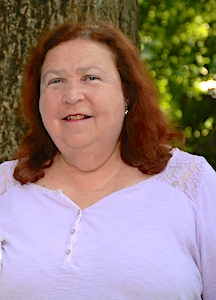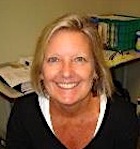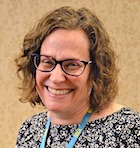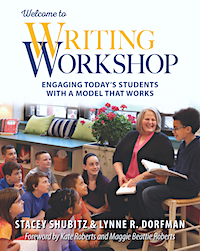Paying It Forward: Why We All Need Mentors
As a new school year approaches, our three co-authors consider the important role that mentors play not only in the lives of our students but in the lives of novice and veteran teachers.
By Lynne R. Dorfman, Brenda Krupp and Aileen Hower

Lynne
Years ago Lynne read a book called A Hope in the Unseen: An American Odyssey from the Inner City to the Ivy League by Ron Suskind. The author followed Cedric Jennings, a smart and determined honor student at a high school in one of Washington D.C.’s most dangerous neighborhoods, where the dropout rate was well into double digits, through his years at Brown University.

Brenda
Cedric Jennings’s driving ambition was to attend a top college. The idea that stood out to Lynne was the way Cedric seemed to know when he needed another mentor in his life. His strong mother, his pastor Bishop Long, a high school teacher, and his sponsor Dr. Donald Korb all served as mentors for him in his journey to achieve his goal.

Aileen
In September 1995, after years of struggles and dedication, he realized his dream when he began as a freshman at Brown University. When Lynne finished reading the book, she could not help but think that today’s teachers might be able to turn the tide by offering encouragement to more of our unseen children.
Mentorship helps young people find success
Students need mentoring relationships to grow and flourish. Allyn and Morrell’s Every Child a Super Reader: 7 Strengths to Open a World of Possible identifies belonging, curiosity, friendship, kindness, confidence, courage, and hope as strengths of a “super reader.” Mentorship can address these strengths, too.
Don Graves’ classic, The Energy to Teach, and Zachary and Fain’s The Mentor’s Guide: Facilitating Effective Learning Relationships (3rd Ed.) nurture the idea of mentorship being key to our success as students and as capable, productive citizens. Other books about mentoring include Johnson’s On Being a Mentor: A Guide for Higher Education Faculty and Axelrod’s 10 Steps to Successful Mentoring.
What makes a good mentor? A mentor always acts in the best interest of a mentee. Mentors offer expertise, transferring professional knowledge and feedback from an experienced vantage point. They have the willingness and desire to share what they know, actively listen (often doing more listening than talking), and demonstrate qualities of empathy and understanding.
It’s important to have mentors in our lives; essential, really.
Some of our mentors stay with us for a long time and continue to help us grow, push forward, and evolve. For Lynne, her grandfather was an important mentor. He modeled for her what is meant by the Golden Rule. Lynne still tries to live her life by his example. Other mentors may be short term such as a grade school or secondary school teacher, or a university professor.
New teachers in some school systems are assigned a mentor who is a support, a guide, a counselor during a three-to-five-year induction program. Often, the bond created here goes well beyond the program. In Lynne’s case, the last mentor relationship she was assigned in her district blossomed into a lifelong friendship. Lynne read at Karen’s wedding and she was a bridesmaid in Lynne’s wedding. They celebrate birthdays and often, holidays.
Almost 20 years later, they email, talk, and text; sorting out problems, providing advice and support, laughing together, sharing bits and pieces of their lives. What joy it brings to continue this mentor relationship into myriad facets of their personal and professional lives!
Setting goals and defining expectations
Mentors encourage and enable another person’s professional or personal development. A mentor can help focus their efforts by encouraging the mentee to set goals and by giving feedback that will help the mentee work through problems and decisions. We all agree that the first step is to encourage mentees to define their expectations, and begin the conversation there.
A mentor’s knowledge can contribute to the sense that one is joining a high-quality and productive workforce. Employees appreciate workplaces that encourage development, as it can demonstrate that their employer values them and wants to see them grow.
A mentor can help their mentee set personal or professional development goals and help their mentee be accountable for accomplishing those goals. When mentees find themselves struggling to perform their job or to reach a goal, they can turn to their mentor for support, especially when there is no evaluative or judgmental component to the relationship. This encouragement can motivate them to keep moving forward despite challenges.
A mentor can also identify and express their mentee’s strengths to instill confidence in them. Having a strong sense of confidence can make the mentee less likely to give up on their goals. Aileen had a number of mentors throughout her college career who saw more in her than she saw in herself. These teacher mentors held conversations with her that encouraged her to accomplish things or set goals that she never considered or didn’t have the confidence to pursue as a first-generation college student. Attending a doctoral program and applying to positions in higher education are all career paths that became possibilities for Aileen, thanks to the encouragement of her teacher mentors.
A mentor is a resource to discuss ideas, projects, and/or opportunities and to try them out individually or in partnership and to give feedback and encouragement. The mentor can provide unbiased advice or opinions using their relevant knowledge and experience. With these insights, the mentee can better understand what steps to take and whether to pursue the idea or walk away.
A mentor can also listen and advise mentees on daily concerns, such as workplace conflicts, and give feedback when it’s needed. When the mentor establishes trust with the mentee through fostering an environment that supports the mentee (not criticizing or evaluating them), the mentee comes to understand that constructive criticism aims to build their professional growth. Both mentor and mentee improve their intrapersonal and interpersonal skills because of their relationship.
Teachers helping teachers
While some mentors are assigned to new teachers as they complete induction, finding a mentor may be something you have to do on your own. In the book Thrive: 5 Ways to (Re)Invigorate Your Teaching, author Meeno Rami suggests asking yourself questions to identify an area of interest where a mentor may be helpful for your growth.
- What are you curious about in your field?
- What are my students interested in that I would like to learn more about?
- What am I already doing that I want to get better at?
These questions may get you started on the road to identifying a possible mentor and may lead you to consider new possibilities for mentor relationships. When Brenda wanted to bring reading workshop into her classroom, she realized that she would need a mentor with workshop expertise.
Unfortunately, at that time there was no one on-site who could assist her. She turned to professional books, conference sessions, and on-line conversations with authors she was reading. Eventually, some of these authors became colleagues and mentors.
When choosing a mentor consider the relationship you want to have with the person, their availability, and the guidance level you are looking for in this relationship. Mentors can make a huge difference in your teaching life.
Strengthening the mentor-mentee relationship
If you are currently a mentor, here is a possible way to check in with your mentee(s) when busy schedules do not allow much time for face-to-face talk. Periodically sending a checklist may be an easy and efficient way to know what you can do for your mentee.
Mentorship promotes reciprocity. The mentee works toward specific goals and grows as an individual, and the mentor enhances his or her own self-awareness and mentoring skills. Mentees can also share their insights on new research, learning, or technologies they have acquired through university classes with their mentors. In this way, they are learning from each other.
Done right, mentoring leads to increased engagement, diminishes or eliminates isolation and exclusivity, and promotes a spirit of camaraderie and collaboration. Meaningful relationships take time to mature because mentorships thrive on trust – and it takes time to build trust. Trust will come if we are reliable, consistent, and committed to the mentor role.
Leadership work that’s so rewarding
Being a mentor offers many rewards, and like anything worth mastering, mentoring takes time, practice, and immense learning from experience to grow and excel as a supportive colleague and advisor.
Becoming a mentor has many benefits. Mentors build leadership skills and confidence, grow networks, and provide a sense of fulfillment. Being a mentor reminds us of what we enjoy about our profession, fostering our own renewed engagement.
Although mentors in formal roles deserve to be compensated, knowing that we made a positive impact on someone’s life or career is a reward beyond monetary compensation. Thinking about the mentors in our lives can spur us on to be a mentor for family members, students, or colleagues at work.
Whether we are mentoring our students or our colleagues, the mentor relationship is a win-win for mentor and mentee. As mentors, we can realize a unique personal fulfillment and grow as a listener, a coach, a friend, and an educational leader. And who knows? One day, our mentees may decide to “pay it forward” and become mentors themselves.

Brenda Krupp is an NWP fellow and co-facilitated the Pennsylvania Writing & Literature Project’s invitational writing institute for 16 years. She served Souderton Area School District as a third grade teacher and as a teacher leader.
Aileen Hower is past president of Keystone State Literacy Association and assistant professor and graduate coordinator of the Masters in Education in Language and Literacy at Millersville University, as well as the graduate coordinator of the Program Specialist in ESL Certification. Currently, she serves KSLA as the ILA coordinator.




































